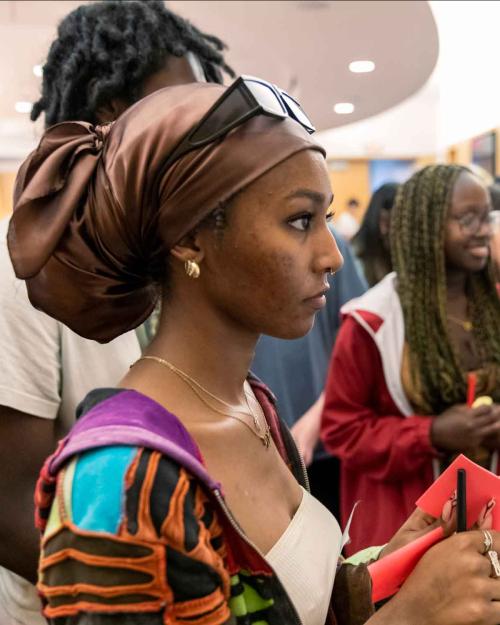Wooden skewers, popsicle sticks, Scotch Tape and a rainbow collage of pipe-cleaners decorated the tablecloths after the Milstein Program in Technology & Humanity’s annual welcome dinner late last month at the Ithaca Farmers Market.
As a part of the event, students split into mixed-grade teams and competed to build a catapult capable of launching marshmallows the farthest distance. The competition encapsulated the key principles of the Milstein Program: cross-cohort collaboration, creative problem solving and interdisciplinary thinking, as well as having fun.
At the dinner, students also heard from Malte Ziewitz, associate professor of science and technology studies in the College of Arts and Sciences and the Milstein Program’s interim director, and other Milstein students, who spoke about their experiences spearheading projects in the program and participating in the program’s Summer Session.
The event was the first of three this month aimed at building cross-cohort relationships and orienting new and current students alike to the coming year. The second event was an informational talk about the program’s annual Summer Session at Cornell Tech on Roosevelt Island, led by Michael Byrne and Angie Gomez; and the third was a team-building workshop for first-years, sophomores, and juniors hosted by Cornell Tech’s Bil Leon.
Mary Kolbas ’24 shared her experience of the Milstein Program’s Summer Session.
“I definitely loved the summer program. There were just so many opportunities to learn; it was very exploratory,” she said. “I remember Bil (Leon) was teaching us how computers work, and I feel like it was something I could never really learn from the classroom. I also have a hard time learning things on my own online, and so just having someone to sit me down and teach me something that’s seemingly so basic or so specific to one field … is really enlightening, even if I don’t choose to do anything down that path.”
Ameya Kamani ’26 expressed excitement about potentially attending the Cornell Tech program next summer. For him, it offers an opportunity not only to hone technical skills, but also to explore and learn more about the city.
Other students emphasized that the aim of the Milstein Program is to create not only good students, but also well-rounded people and citizens who contribute to the communities in which they live, work and study.
“Even though I’m from New York City, I’ve never explored Roosevelt Island and I haven’t participated in anything like this before. It seems transformative and also really fun!” Marian Caballo ’26 said. “One thing that stood out to me was the fact that the Milstein cohort worked directly with NYC community service organizations to give back to the community. I’m from Queens, and I think it is truly so special I get to work on innovative technology projects while giving back to the community I was born and raised in, especially since I’ve been exposed to some of the problems that the program is working to solve.”
During Leon’s workshop, students took part in various improv activities and rapid-fire Q&As with other Milstein students about the summer and their hopes for the fall. These activities encouraged students to collaborate, exchange ideas and learn from each other.
“One valuable lesson I learned about collaboration is that it can be spontaneous,” Caballo said. “You really have to challenge yourself to step out of your comfort zone sometimes, like through improv.”
The last activity was “One Ask,” in which students wrote one request on a sheet of paper and taped it to the wall. Other students looked at their peers’ requests and wrote their contact information if they thought they could offer assistance.
Walking the gallery of asks, one could see a panoply of different interests. One person sought fashion advice, while another asked for help with writing. One student looked for tips for dealing with anxiety, while another solicited musicians to start a band. And scrawled under all of these requests were the NetIDs of those students who offered to help, or a small sentence offering advice.
Caballo said the exercise showed her possible connections she could make within the program.
“I also learned about the importance of reaching out for help, and building a network of support,” she said. “The post-it advice activity towards the end of the session showed me that the Milstein program is a great place for me to do so.”
For juniors, the workshop had special importance because it stressed collaboration, which will come into play as they consider their junior projects.These are year-long, independent studies that every junior undertakes to explore the issues, topics, and technologies that interest them, while partnering with local nonprofits, other institutions or student groups. The project’s final product can take any form, including but not limited to art, research or app development.
“I’m just really excited to work with the people [on the junior project] — new people and people I’m already friends with — to create something really profound,” Kolbas said. “You can say that you did this project yourself with your team, as opposed to (just) coursework, and I think that’s a really great experience that the Milstein Program offers.”




